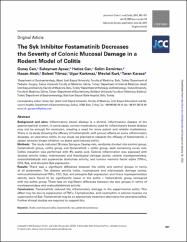The syk inhibitor fostamatinib decreases the severity of colonic mucosal damage in a rodent model of colitis
| dc.contributor.author | Can, Güray | |
| dc.contributor.author | Ayvaz, Süleyman | |
| dc.contributor.author | Can, Hatice | |
| dc.contributor.author | Demirtaş, Selim | |
| dc.contributor.author | Akşit, Hasan | |
| dc.contributor.author | Yılmaz, Bülent | |
| dc.contributor.author | Korkmaz, Uğur | |
| dc.contributor.author | Kurt, Mevlüt | |
| dc.contributor.author | Karaca, Turan | en_US |
| dc.date.accessioned | 2019-10-17T07:08:06Z | |
| dc.date.available | 2019-10-17T07:08:06Z | |
| dc.date.issued | 2015 | en_US |
| dc.identifier.issn | 1873-9946 | |
| dc.identifier.issn | 1876-4479 | |
| dc.identifier.uri | https://doi.org/10.1093/ecco-jcc/jjv114 | |
| dc.identifier.uri | https://hdl.handle.net/20.500.12462/7498 | |
| dc.description | Akşit, Hasan (Balikesir Author) | en_US |
| dc.description.abstract | Background and aims: Inflammatory bowel disease is a chronic inflammatory disease of the gastrointestinal system. In some cases, current medications used for inflammatory bowel disease may not be enough for remission, creating a need for more potent and reliable medications. There is no study showing the efficacy of fostamatinib, with proven effects on some inflammatory diseases, on ulcerative colitis. In our study we planned to research the efficacy of fostamatinib, a spleen tyrosine kinase inhibitor, on acetic acid-induced colitis. Methods: The study included 28 male Sprague-Dawley rats, randomly divided into control group, fostamatinib group, colitis group and fostamatinib + colitis group, each containing seven rats. Colitis induction was performed with 4% acetic acid. Colonic inflammation was assessed with disease activity index, macroscopic and histological damage scores, colonic myeloperoxidase, malondialdehyde and superoxide dismutase activity, and tumour necrosis factor alpha [TNF alpha], CD3, Syk, and phospho-Syk expression. Results: There was a significant difference between the colitis and control groups in terms of all parameters. The disease activity index, macroscopic and microscopic damage scores, immunohistochemical TNF alpha, CD3, Syk, and phospho-Syk expression, and tissue myeloperoxidase activity were found to be significantly lower in the colitis + fostamatinib group compared with the colitis group. There was no significant difference between the two groups in terms of myeloperoxidase and malondialdehyde activity. Conclusions: Fostamatinib reduced the inflammatory damage in the experimental colitis. This effect may be due to suppression of TNF alpha, T-lymphocytes, and neutrophils in colonic mucosa via suppression of Syk. Fostamatinib may be an appropriate treatment alternative for ulcerative colitis. Further clinical studies are required to support this. | en_US |
| dc.language.iso | eng | en_US |
| dc.publisher | Oxford Univ Press | en_US |
| dc.relation.isversionof | 10.1093/ecco-jcc/jjv114 | en_US |
| dc.rights | info:eu-repo/semantics/openAccess | en_US |
| dc.subject | Acetic Acid-Induced Colitis | en_US |
| dc.subject | Fostamatinib | en_US |
| dc.subject | Rats | en_US |
| dc.subject | Spleen Tyrosine Tinase | en_US |
| dc.title | The syk inhibitor fostamatinib decreases the severity of colonic mucosal damage in a rodent model of colitis | en_US |
| dc.type | article | en_US |
| dc.relation.journal | Journal of Crohns & Colitis | en_US |
| dc.contributor.department | Veteriner Fakültesi | en_US |
| dc.contributor.authorID | 0000-0002-2500-7781 | en_US |
| dc.contributor.authorID | 0000-0003-3726-5945 | en_US |
| dc.contributor.authorID | 0000-0002-6054-9244 | en_US |
| dc.contributor.authorID | 0000-0001-5430-9917 | en_US |
| dc.identifier.volume | 9 | en_US |
| dc.identifier.issue | 10 | en_US |
| dc.identifier.startpage | 907 | en_US |
| dc.identifier.endpage | 917 | en_US |
| dc.relation.publicationcategory | Makale - Uluslararası Hakemli Dergi - Kurum Öğretim Elemanı | en_US |
Bu öğenin dosyaları:
Bu öğe aşağıdaki koleksiyon(lar)da görünmektedir.
-
Pubmed Makale Koleksiyonu [971]
Pubmed Article Collection -
Scopus İndeksli Yayınlar-Makale Koleksiyonu [4960]
Article Collection -
Temel Bilimler-Makale Koleksiyonu [110]
Basic Sciences-Article Collection -
WOS İndexli Yayınlar-Makale Koleksiyonu [4942]
WOS Indexed Publications-Article Collection


















